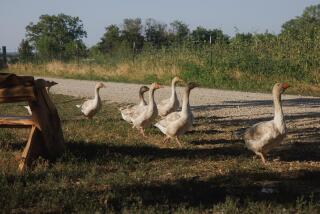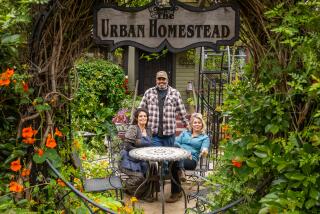Latvian Farm Yields Fresh Food, Independence : Soviets: A partially capitalist collective has not waited for Moscow to begin agrarian reform.
ADAZI, U.S.S.R. — When Andris Bush and his wife want something special for dinner, they make a quick trip to the well-stocked market on the Latvian collective farm where they live, work and are shareholders.
Their partially capitalist collective may not be entirely legal, but Bush said: “If we waited for the laws to be passed, all we would have here would be weeds.”
Mounds of ground beef, a freshly slaughtered rabbit, loins of pork, piles of roasted coffee beans, bottles of fresh milk, grapes and even peanuts were for sale at stands in the market building.
“There aren’t any pineapples or bananas,” the 35-year-old carpenter said with a smile. “Things are much better here than in the city, but the level of the West still is very far away.”
He grows onions, carrots, potatoes and several kinds of berries on his 1 1/2-acre garden plot to supplement the family diet. His mother helps by raising pigs.
The Adazi collective farm did not wait for Moscow to begin agrarian reform.
Its people voted late last year to become a joint-stock enterprise. On Jan. 1, each member received shares in the farm based on his type of job and length of service.
Bush wants to expand his garden plot by an acre or two and is seeking someone who will trade land for shares in the collective.
Neither Soviet nor Latvian laws permit such transactions, but they are allowed under the farm’s new rules.
Private plots, usually an acre or less, have been permitted in the Soviet Union since the 1950s. Alec Nove, a professor of economics at the University of Glasgow, said they account for well over one-fourth of all Soviet farm produce.
Adazi has increased its holdings over the years by absorbing smaller, less efficient farms in the area and now totals 19,000 acres, but it is not among Latvia’s largest collectives.
Stands in the market, which is open to the public, offer meat and vegetables from the collective and from the individual plots cultivated by the 5,000 people who live on the farm. Some items, like coffee, are purchased from the state for resale.
Food is much more plentiful in the countryside than in Riga, the Latvian capital 12 miles away. Food shortages are chronic in Moscow and many other cities because the Soviet distribution system has broken down.
Latvians, like residents of the neighboring Baltic republics, Lithuania and Estonia, have had enough of the Soviet system. They declared political and economic independence last year.
Soviet President Mikhail S. Gorbachev is trying to block Baltic independence. Soviet troops have attacked the separatists in the past few weeks, killing 20 people in Latvia and Lithuania.
Before the violence, trains packed with shoppers from other republics arrived in Riga every day.
So far, bloodshed has been confined to the cities and food remains plentiful in the relatively tranquil countryside.
In addition to the good selection of meat in the collective’s market, the Bushes can choose from three kinds of bread at the farm bakery, including long French loaves. Now and then, the family eats at the pizzeria owned and operated by the farm.
Such an outing is a treat, but possible on Bush’s monthly salary of 600 rubles, which is more than double the national average of 267 rubles. His pay is worth $375 at the official exchange rate, but much less in reality.
Although the market, bakery and pizzeria are open to the public, few people come from Riga, because the bus trip takes more than half an hour each way.
Prices for bread and vegetables at the farm are comparable to those at state stores in the capital, but meat and dairy products generally cost less and are of better quality.
In Riga, patrons of state stores must show identity cards at some counters. Rationing has been introduced for such items as cooking oil, butter, coffee and vodka.
At dusk one winter day, Nadezhda Prunchkin, a Russian grandmother married to a Latvian, hurried to an office to trade vodka coupons for coffee coupons. The office was closed. She muttered to herself and went in search of meat.
At a state store on nearby Brivibas (Freedom) Street, about 50 people waited for milk. There were lines for a poor selection of meat being sold next door at prices double those of the collective farm.
There are no lines at the Adazi market.
Bush said he planned to stay on the farm, where he has spent 12 years building silos and repairing buildings.
He has a comfortable apartment for his wife and two sons. There is a school for the boys, and Adazi’s fields, forest and lakes make a vast playground.
“People from the city come looking for work here,” Bush said.
More to Read
Sign up for Essential California
The most important California stories and recommendations in your inbox every morning.
You may occasionally receive promotional content from the Los Angeles Times.










